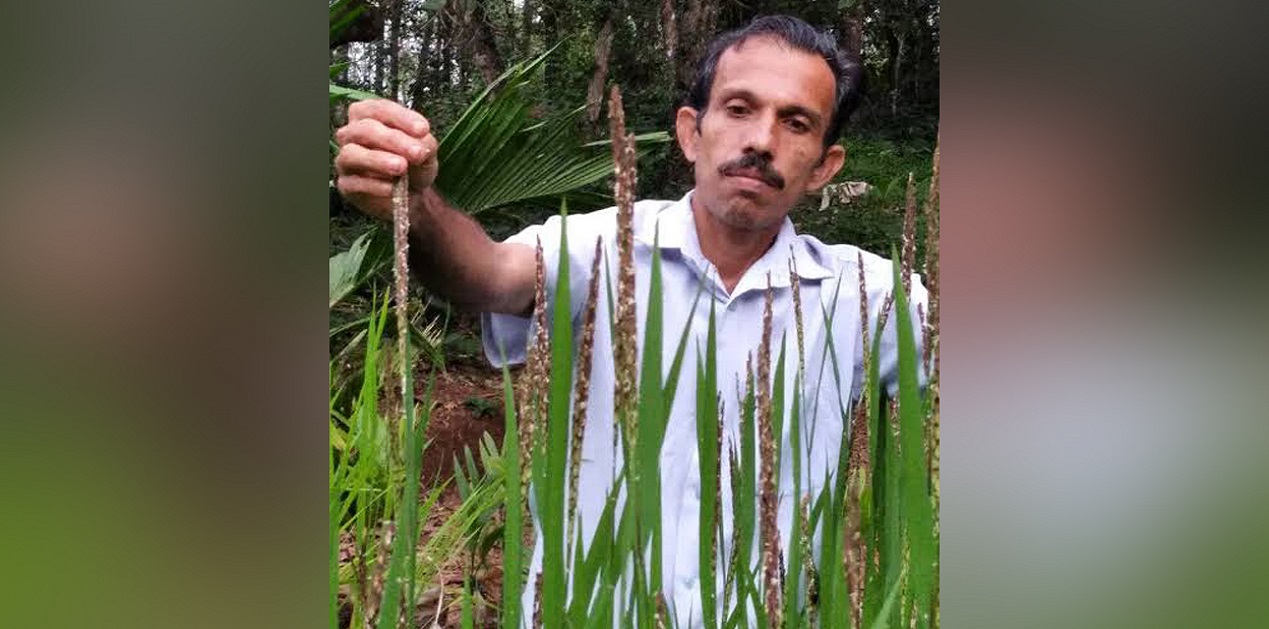Shri. Sathyanarayana Beleri, a paddy gene bank conservator and farmer from the Belur village of Kasargod, Kerala was recently conferred with the prestigious Padma Shri award by the Government of India for his contributions in the field of agriculture. Beleri, also known as Seeding Sathya, is credited with conserving over 650 traditional varieties of rice. As per a 2024 Mathrubhumi report, of the rice seeds that Beleri has collected and conserved over the years, 200 are of rare varieties.
Beleri is known to have successfully introduced a variety of rice known as Rajakayame, augmenting its conservation and production across three states of the country, namely, Kerala, Karnataka and Tamil Nadu. He is also credited for conserving the traditional rice varieties through an innovative method known as ‘Polybag Method’. In this method, around 10-20 seeds of each variety of paddy are sown in separate paper cups. These paper cups are filled with pot mixture and are properly labelled. To aid germination of seeds, optimum moisture content is ensured until the tenth day. After 10 days, these seedlings are transplanted to polybags filled with compost mixture and are placed close by, in an open space with sunlight. Until flowering, the seedlings are watered and nutrients are provided through the application of 100 ml of ‘jeevamrutha’ every week. Once the process of flowering starts, these polybags are shifted to a shallow water pond covered by a tarpaulin sheet and safeguarded by a bird net. Beleri also takes adequate care to prevent cross-pollination of these varieties while transplanting the crops. His innovative approach requires much less resources and effort. Through the Polybag Method, this farmer has been able to conserve not just the indigenous and rare varieties of rice but the traditional seeds of nutmeg, areca nut and black pepper as well. However, the process of conservation of ‘landacres in field gene bank’ is cumbersome and requires a considerable amount of time, energy, space and labour and no commensurate monetary returns.
Beleri’s repository of key traditional seed varieties includes Aktikaaya, Kalame, Kagga, Ghangadale, Chitteni, Gandhasaale, Kumkumasaale, Kottambarasaale, Narikela, Karigajavali, Raaja Mudi, and many more. Beleri has also developed two new paddy varieties, namely, Trinetra and Shivam. Furthermore, he is also a custodian of rice varieties like Vellathovan from Kerala and Puttabatta that give good yields in a water-scarce field or Kagga that can be grown in saline soil. , He also has a paddy variety known as the Edi kuni that has the potential to survive floods and the Manila variety is known to be a saltwater tolerant organic rice. Beleri also owns traditional rice varieties with medicinal value. For instance, Karigajavali (also known as black basmati), a rice variety from Belgaum region of Karnataka, is a rich source of iron and so its gruel is served to new and pregnant mothers. Beleri readily shares the traditional wisdom with his listeners. According to a 2021 report in The Better India, Beleri’s interest in cultivating varied rice varieties has resulted in the procurement of seeds from states like Assam, Karnataka, and Manipur and even from countries like Japan and Philippines, painstakingly adding these varieties to his existing paddy strain inventory.
What was Sathyanarayana Beleri’s reaction to receiving the coveted Padma award? “The Padma award was unexpected. This recognition makes me more responsible. I would continue my mission and add more seeds to my collection.” Interestingly, paddy cultivation is not this farmer’s source of livelihood. He considers himself to be a conservationist and not a paddy cultivator as his livelihood depends on cultivation of rubber and areca on a plot of land jointly owned by his family. Beleri pursues paddy cultivation for the love of it and not for profit; a mission that brings many researchers and students frequently to his fields. Beleri also acknowledges the support that his conservation mission receives from farmers and agricultural scientists in the country who are willing to share their seeds with him. He too, in his turn, makes it a point to distribute the seeds he has conserved amongst the farmer community. In 2021, Beleri was also honoured with the Plant Genome Saviour Farmer Reward for his efforts in conserving rice varieties.
The world we live in today is a paradox – one where most people are increasingly becoming health conscious but have no time or energy to cook traditional meals or even explore and research the country’s traditional food sources that are known to be laden with innumerable health benefits. The link and connections to traditional wisdom are slowly fading. It is in such a time and place that the conservation efforts of people like Sathyanarayana Beleri become significant, not just for the present generation, but for many generations to come.
Disclaimer: Spellings of rice varieties are retained as given by sources.
(The paper is the author’s individual scholastic articulation. The author certifies that the article/paper is original in content, unpublished and it has not been submitted for publication/web upload elsewhere, and that the facts and figures quoted are duly referenced, as needed, and are believed to be correct). (The paper does not necessarily represent the organisational stance... More >>
Image Source: https://img.onmanorama.com/content/dam/mm/en/kerala/top-news/images/2024/1/26/padma-shri-sathyanaranan-beleri.jpg











Post new comment